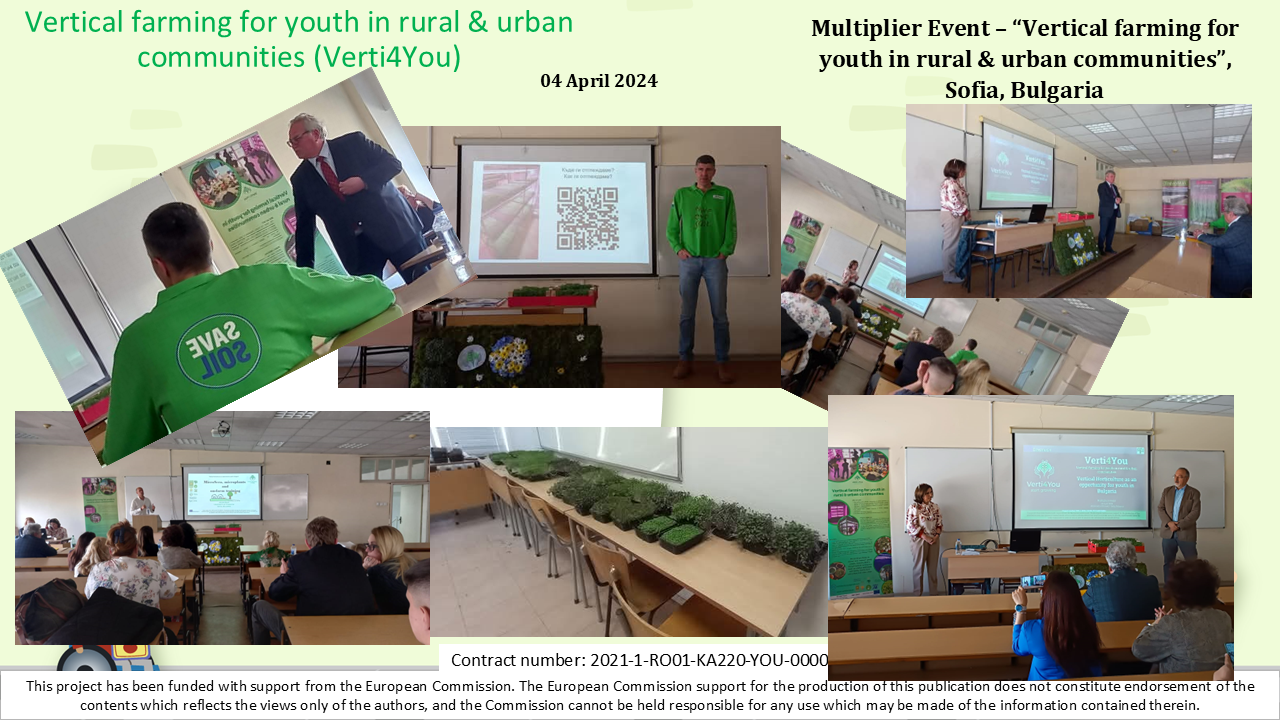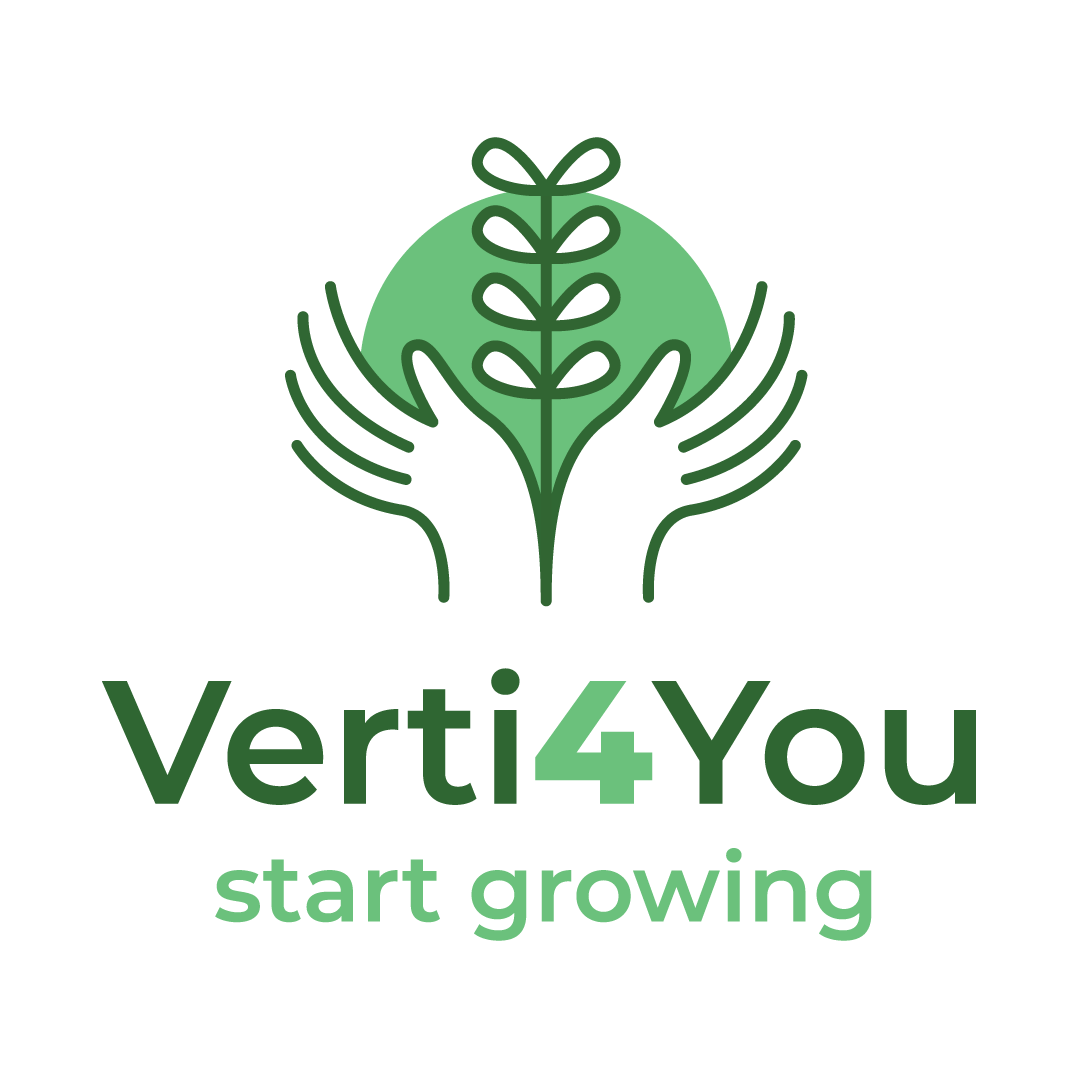- Home
- Multiplier events
Multiplier Event – “Vertical Horticulture as an opportunity for youth in Romania”, January 29th, 2025, Bucharest
The Romanian Multiplier Event was organized on January 29th, 2025, at the University of Agronomic Sciences and Veterinary Medicine of Bucharest, in the Aula Magna “Petre S. Aurelian.” This event was part of the dissemination strategy of the Erasmus+ Verti4You project and aimed to promote vertical horticulture as a tool for youth empowerment and social entrepreneurship.
The event gathered over 240 participants, out of which 50 attended physically and 191 followed the event online via the Faculty of Horticulture’s official YouTube live stream【https://www.youtube.com/watch?v=z26glpruMvU】. The diverse audience included university students, teaching staff, youth workers, NGO representatives, researchers, and representatives of private companies and agricultural producers interested in sustainable horticulture, microgreens cultivation, and innovative production systems.
The agenda included institutional greetings by Prof. Adrian Asănică (Dean of the Faculty of Horticulture) and Prof. Liliana Bădulescu. Dr. Adina Someșan, Director of International Relations and Mobilities at USAMV Bucharest, also addressed the audience, expressing appreciation for the implementation of the project within the university and acknowledging the efforts made by the entire team. This was followed by several thematic presentations.. Among the key topics discussed were: the development and impact of the Verti4You training activities in the four partner countries; the structure and accessibility of the digital training packs for youth and youth workers; and the role of vertical farming in social inclusion and ecological transition. Contributors such as Roxana Ciceoi (Project Coordinator), Oana Venat (Communication Manager), Mihaela Monica Dinu (Research Institute for Plant Protection), and Vlad Grigoraș (Friends of Children NGO) brought valuable perspectives from academia, research, and the field.
The afternoon session was dedicated to an applied visit at the “Green Hub Kaufland” by Ultragreens in Ploiești, where participants engaged with microgreens production in a professional environment. Victor Potra from Ultragreens introduced the production modules and discussed technical and commercial aspects related to sustainable vertical farming.
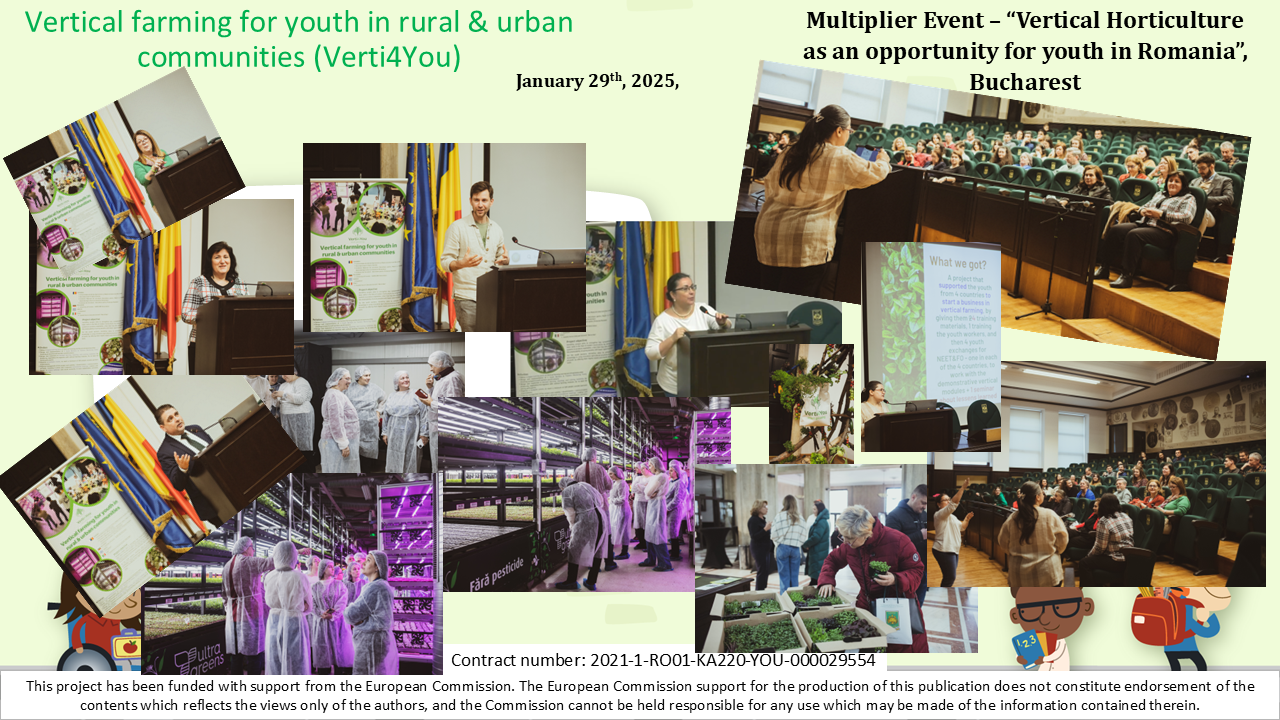
Multiplier Event – “Vertical Farming for youth” in Hopeland, Greece, November 12–14, 2024
As part of the Erasmus+ project Verti4You (KA220-YOU), a two-day Multiplier Event titled “Vertical Farming for Youth” was organized in Hopeland, Greece, in Hopeland Education Centre, Argolida, aiming to promote sustainable agricultural practices and social entrepreneurship among young people, especially those facing fewer opportunities. The event was designed as an immersive educational experience, aligning with the project’s objectives and Hopeland’s values of simplicity, reusability, and ecological responsibility.
28 young individuals, including NEETs, from Greece, France, Spain, Poland, Italy, and Romania, included young adults with varied social and cultural backgrounds and a shared interest in sustainable living, ecological farming, and community work. The structure of the group encouraged intercultural exchange and peer learning, enriching the overall impact of the event.
Unlike conventional approaches relying on high-tech systems, this event showcased a fully sustainable and low-tech vertical farming model tailored to the local context. A greenhouse was built from scratch on-site, using reused and natural materials, without any artificial lighting or automation. The model demonstrated that vertical farming can be both affordable and environmentally responsible.
The event activities were structured as follows:
Day 1 – Theoretical sessions and introduction to the project:
• Welcome and overview of the Verti4You project
• Ice-breaking activities and group facilitation
• Keynote presentation: “Vertical Farming as a Path to Sustainable Entrepreneurship”
• Workshop on vertical farming principles, sustainable irrigation systems, and vertical cultivation techniques
Day 2 – Practical implementation and local engagement:
• Greenhouse work: seeding, planting, and system setup using only natural light
• Composting workshop using local organic waste
• Interactive discussions with community members on adapting vertical farming to different environments
• Distribution of certificates and structured feedback collection
The event contributed to strengthening participants’ understanding of vertical farming and ecological sustainability, while also increasing their motivation to engage in social entrepreneurship. Through hands-on activities and group discussions, young people acquired practical skills related to greenhouse construction, plant cultivation, and composting. The methodology applied during the event proved effective and adaptable, offering a replicable model for future educational initiatives at local level.
Building on this momentum, participants were encouraged to act as multipliers by applying and sharing the knowledge gained in their communities. Hopeland expressed its intention to continue supporting youth through mentoring and peer-led follow-up activities. Inspired by the success of the event, the project consortium is considering adapting and replicating this model in other partner countries.
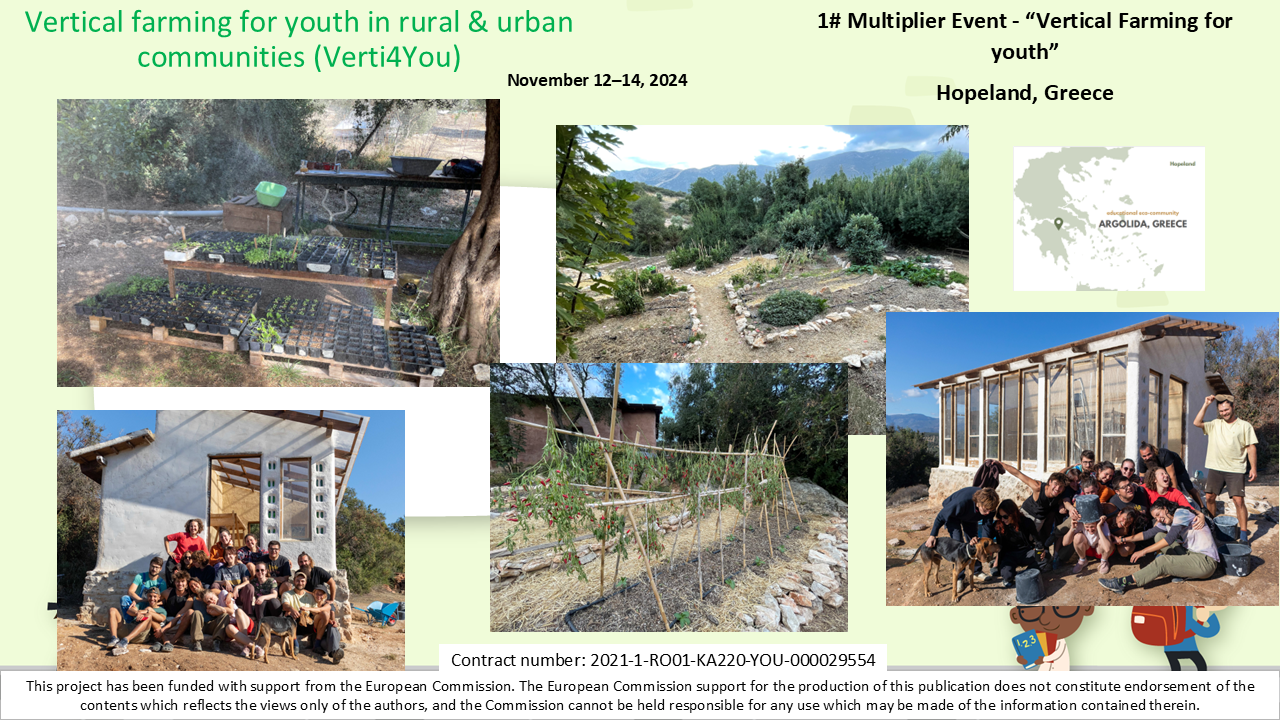
Multiplier Event – “Promoting Vertical Farming to youth” in Athens, Greece, November 5, 2024 (second event)
On November 5, 2024, Hopeland organized the second Multiplier Event of the Erasmus+ project Verti4You (KA220-YOU) in Athens, Greece. The event was hosted in collaboration with the Greek Council for Refugees and gathered 23 participants, including youth workers, educators, and young people with diverse cultural and social backgrounds. Several attendees were involved in integration and support programmes for migrants and asylum seekers, which allowed the event to explore the use of vertical farming not only as a tool for entrepreneurship, but also for social inclusion and empowerment.
The event aimed to introduce participants to the Verti4You project and its educational materials, while promoting urban and peri-urban agriculture as a sustainable and accessible activity. Discussions were focused on how vertical farming, particularly microgreens cultivation, can be implemented in constrained urban spaces and adapted to low-resource contexts. Participants were encouraged to reflect on how this model could be transferred to vulnerable communities and integrated in youth-focused learning.
The agenda of the day included:
• A welcome session and introduction to the objectives and partnership of the Verti4You project
• A presentation of the two Digital Training Packs developed within the project, with a focus on vertical farming systems and social entrepreneurship
• Interactive discussions on practical implementation and success factors in local contexts
• A hands-on microgreens tasting and demonstration using simple, replicable techniques
• A feedback and reflection session dedicated to capturing participants’ impressions, needs, and ideas for future replication
Throughout the event, participants had the opportunity to exchange experiences and discuss the challenges and opportunities they encounter in their daily work with disadvantaged youth. Many of them expressed interest in using the Verti4You educational tools within their organizations and appreciated the project’s inclusive and low-tech approach. By the end of the session, participants demonstrated increased awareness of how vertical farming can function as a practical, green, and socially valuable practice. The event provided an important dissemination moment in Greece, fostering dialogue between NGOs, educators, and community workers, and encouraging further cooperation at national and European level.
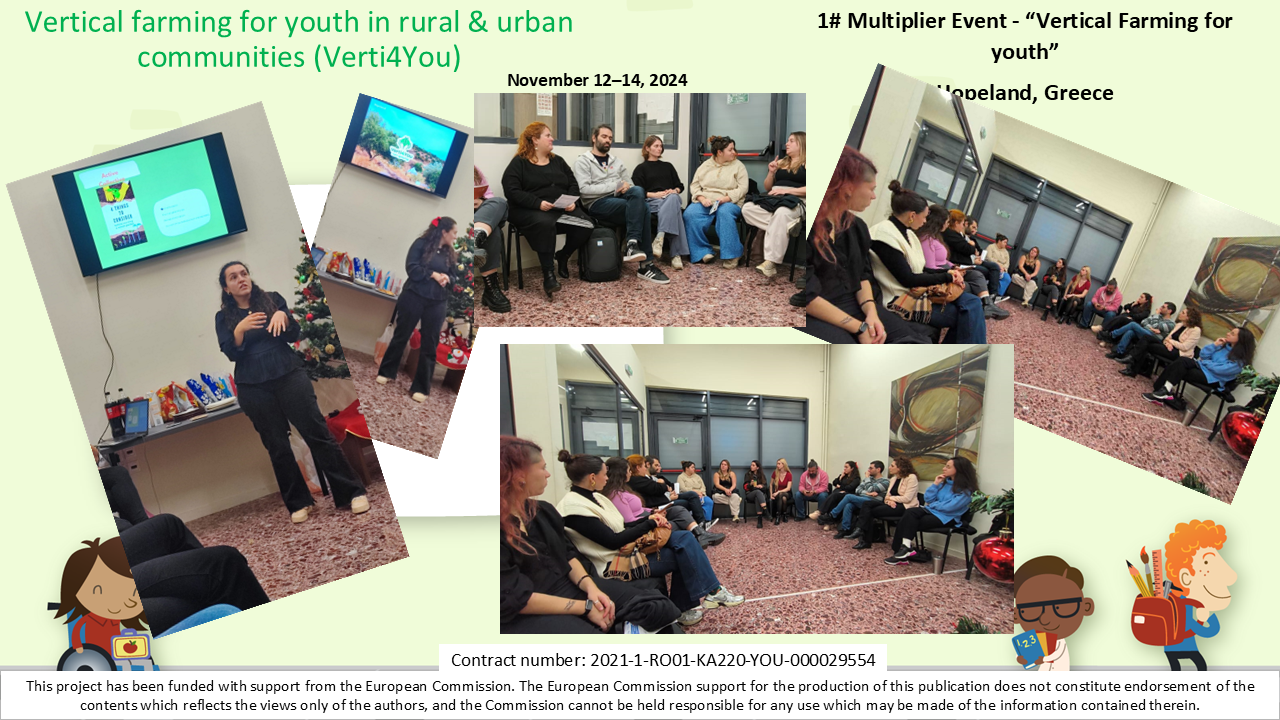
Multiplier Event – Vertical Horticulture as an opportunity for youth in Bulgaria, Sofia, 04 April 2024
The Bulgarian Multiplier Event within the Verti4You project was held on April 4, 2024, at the University of Forestry in Sofia, Bulgaria. The event was jointly organized by the Faculty of Agronomy and the Faculty of Ecology and Landscape Architecture, in collaboration with the private partner Versol Biofarm. It aimed to promote the innovative tools and approaches developed through the project, with a special focus on vertical farming and youth engagement in sustainable practices and green entrepreneurship.
A total of 141 participants took part in the event, of which 50 attended in person and 91 participated virtually via online streaming platforms. The audience included university students, young professionals, entrepreneurs, professors, and members of the general public interested in vertical farming and microgreen production. The session combined academic perspectives, entrepreneurial experiences, and technical applications, providing a comprehensive view of the opportunities vertical horticulture offers young people in both rural and urban contexts.
The agenda of the event included six main contributions:
• Dr. Milena Yordanova opened the academic session with a presentation on the connection between vertical farming and microgreens, based on the project’s first result (PR1).
• Dr. Emil Kitchoukov followed with a presentation on the relationship between vertical farming and social entrepreneurship, linking PR2 to real-life implementation.
• Gergana Mladenova and Boriana Plashkova shared insights into the project’s various training activities (LTTs), highlighting participant engagement and acquired competencies.
• Miroslav Peshovski from Biofarm Versol delivered a practical talk on the training module that had been conducted at the farm, focusing on micro-sera, cultivation techniques, and the adaptation of sustainable methods for small-scale farming.
• Vladislav Tanev, known as the “culinary gardener,” gave an applied presentation on microgreens and baby vegetables in gastronomy, emphasizing market opportunities and educational impact.
• Finally, Stanimir Stoychev from TrevoMat introduced the concept of “vertical pastures,” providing a novel interpretation of vertical farming in the context of local innovation.
The event facilitated dialogue between academia and the private sector, encouraging participants to reflect on both the environmental and entrepreneurial dimensions of vertical farming. Guests had the opportunity to engage with practical demonstrations, observe microgreen cultivation trays, and ask detailed questions about production systems and sustainability indicators.
This event successfully disseminated the intellectual outputs of the Verti4You project in Bulgaria, while reinforcing local engagement. Participants expressed interest in replicating the learning model in educational and community-based contexts, and several follow-up discussions were initiated between the University of Forestry and private stakeholders regarding further cooperation.
